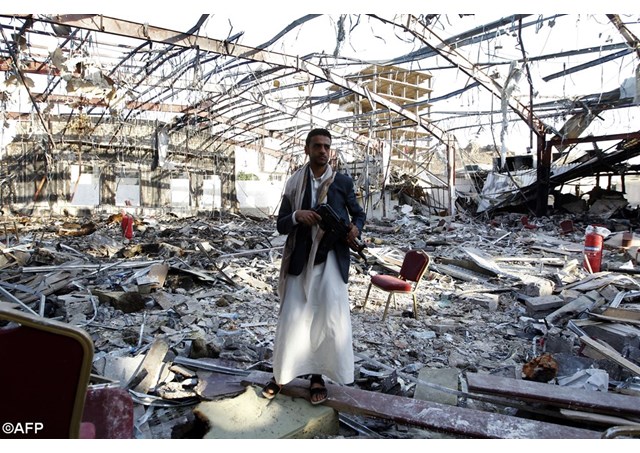
Neglected war in Yemen causing devastating humanitarian crisis

(Vatican Radio) Pope Francis says he is praying for the safe return of a kidnapped priest in Yemen, yet again highlighting his concern for the country which is plummeting into what the UN is calling the worst humanitarian crisis in the world today. Salesian priest Tom Uzhunnalil was kidnapped 14 months ago in Yemen.
Millions of people continue to suffer in Yemen, a country struggling with military conflict, famine, and a failing health system. “There is a child that dies every ten minutes, so it is a serious situation.” Humanitarian organizations are working hard to bring fresh water and medical aid to the people of Yemen, but their efforts are challenged by the ongoing situation in the nation.
CARE International is part of an international network of humanitarian organizations with a program in Yemen that aims to assist those struggling to survive. Colleen Knudsen spoke with the Country Director Wael Ibrahim about the current situation and what his organization believes needs to be done in order to bring Yemen back.
Listen to the report:
“The humanitarian situation is very difficult.” Ibrahim says the only lifeline to the outside world and its resources has been shut down, leaving the people in Yemen without food or medical supplies. “Sana’a airport has been closed since August, last August, which means people, even if they have money, they cannot go for medical care. Students cannot resume their students. Business people cannot run business. So, the economic difficulties of being able just in and out of the country are tremendous, and it takes, for example, thee days for us to be able to send one person out of Yemen to go to a meeting or to a workshop.”
Ibrahim stresses the importance of supporting the people of Yemen in the private sector. CARE distributes food vouchers and cash for the locals to partake in the private sector in order to promote a better economy. “The private sector plays a key role in generating income, creating jobs. Even if we have the 2.1 billion in humanitarian response that we need, this will not be sufficient to provide service to the 26.5 million Yemenites.”
He also argues that the situation in Yemen is complicated and that it is the duty of humanitarian organizations and international governments to help. “This has resulted in exasperating an already very difficult situation. Yemen is the poorest country in the Middle East, at the bottom of the UN development index…Yemen cannot survive on aid alone. There has to be an investment in the development and recovery activities. We would like to see more money going into growing food, building infrastructure, facilitating the opening of the airport, and so forth.”
Ibrahim continues to describe the difficulty of bettering the situation without the support and aid of international actors, such as the United Nations. “Yemen is just too complex to try to explain. What we understand from the media is they’re saying, ‘well, people don’t want to know that there only is famine. They want to know why there is famine, who is responsible.’ And of course as a humanitarian organization, our job is not to lay the blame. Our job is to deal with the consequences. Politicians need to deal with the causes because it is political. It is complex, and it requires focus on that while we as humanitarians need to focus on how people receive services.”
The Australian government recently announced their pledge to the humanitarian efforts in Yemen, saying they will give $10 billion. And Ibrahim hopes this action will show the world that Yemen is important and needs to be addressed. “We are certainly grateful that the Australian government has decided to support the humanitarian efforts. I think we have been engaging with the Australians for some time. I think their interest was, understandably, South Asia, and we’re glad that they see Yemen now as a priority and they have pledged support.”
Ibrahim is grateful for the support and prayers of Pope Francis, and he says the fact that the Holy Father has addressed the issues in Yemen has raised the spirits of the people. “It sends a strong signal to the Yemenites that you are, as humans, of interest to everyone. I’m not sure they is a huge Christian population in Yemen, but the fact that it’s come from a spiritual leader like the Pope, it gives them a message of hope that the world is looking. The world is interested, and the areas where you least except it, for example the Vatican, you are getting strong moral support.”
Yemen has been struggling to survive for many years, and humanitarian organizations like CARE International are working hard to aid and provide the people will the essentials, like fresh water. However, it is up to the international community to see Yemen as a situation worth investing in. The dignity of these people needs to be strengthened through the recovery and rebuilding of their nation.
| All the contents on this site are copyrighted ©. |


